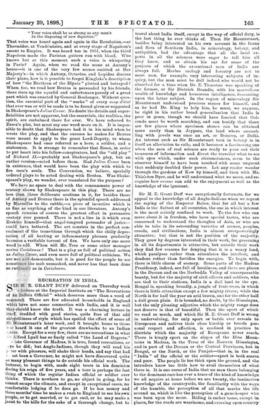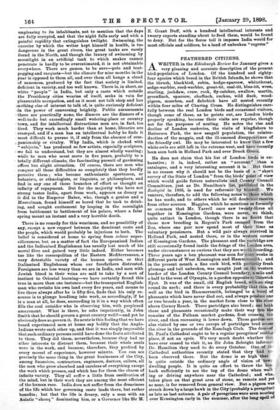RECREATION IN INDIA.
Q IR M. E. GRANT DUFF delivered on Thursday week lecture at the Imperial Institute on "The Recreations of an Indian Official" which deserves more than a word of comnent There are few educated households in England whici have not some connection with India, and it is well they should know the truth. It was a charming lecture in itsef, ttudded with good stories, quite free of that odd snimettiness of style which has spoiled the effect of some of Sit Mountstuart's later work, and it brought home to those v to heard it one of the greatest drawbacks to an Indian .reer. Except for a very few, there are no recreations in what Alfred Lyall has so finely called "the Land of Regrets."
e late Governor of Madras, it is true, found recreations, or .tys he did; but Anglo-Indians, though they will read his it ler with pleasure, will shake their heads, and say that had 'mot been a Governor, he might not have discovered quite øo many Vleasant things to do outside his official work. The lecturer, to begin with, made eight tours in his dominion during his reign of five years, and a tour is perhaps the last thing of which the regular Indian official or soldier ever thinks. There is nowhere to go, no object in going, for he cannot escape the climate, and except in exceptional cases, no comfortable lodging if he does go. If he has money and three months' time he makes a rash to England to see his own People, or to get married, or to get cool, or he may make a jaunt to the hills for the sake of a thorough change, but to
travel about India itself, except in the way of official duty, is the last thing he ever thinks of. Then Sir Mountstnart, besides being interested on his own account in the fauna and flora of Southern India, in mineralogy, botany, and antiquities, had the advantage that all the local ex- perts in all the sciences were eager to tell him all they knew, and so obtain his ear for some of the projects of which the exceptional men of India are always full. Marine zoology and forestry are not to most men, for example, very interesting subjects of in- quiry, but the man must be dull indeed who would not be absorbed for a time when Dr. E. Thurston was speaking of the former, or Sir Dietrich Brandis, with his marvellous wealth of knowledge and humorous intelligence, descanting upon the latter subject. In the region of mineralogy Sir Monntstuart understood precious stones for himself, and as he had Dr. King to help him, he must, we suppose, be right in his rather broad generalisation that India is poor in gems, though we should have fancied that Gol- conda must be worth searching, and can testify that there are few places where specimen stones can be obtained more easily than in Jeypore, the land where enamel. ling with jewels was once an art, or Benares, or Delhi. An interest such as Sir Mountatuart took in botany is in itself an alleviation to exile, and it becomes a fascinating one when the men of real science are ready to pour out their treasures of information and direct the traveller what to see with eyes which, under such circumstances, seem to the observer himself to have been touched with some unguent that suddenly doubled their power. Let any reader wander through the gardens of Kew by himself, and then with Mr. Thisieton Dyer, and he will understand what we mean, and re- cognise how savans can add to the enjoyment as well as the knowledge of the ignorant.
Sir M. E. Grant Duff was exceptionally fortunate, for we appeal to the knowledge of all Anglo-Indians when we repeat the saying of the Emperor Baber, that for all but a few India is the flattest of all countries, the one in which interest is the most strictly confined to work. To the few who can move about it in freedom, who have special tastes, who are concerned to understand the thoughts of Asia, or who are able to take in its astounding varieties of scenes, peoples, creeds, and civilisations, India is almost overpoweringly attractive; but that is not the position of the majority. They grow by degrees interested in their work, for governing in all its departments is attractive, but outside their work they find few reasons for denying that it is a weary land, which paralyses rather than stimulates the intellect, and deadens rather than fortifies the energies. To begin with, there is little charm of scenery. Some parts of the Madras Presidency, indeed, are full of loveliness, and there are places in the Deccan and on the Nerbudda Valley of unsurpassable beauty, bat for the majority of civil officers and soldiers, who are tied to their stations, India is a dull land to the eye_ Bengal is, speaking broadly, a jungle of fruit-trees, in which there is little attraction except a few mighty rivers; while the North is for half the year an arid brown, and for the other half a dull green plain. It is bounded, no doubt, by the Himalayas, but the only pleasing adjective which the mighty range does not deserve is that of beautiful. Then the sport of which we read so much, and which Sir M. E. Grant Duff is wrong in undervaluing, for only sport or battle ever reveals to - Europeans and natives their close kinship or breeds per- sonal respect and affection, is confined in practice to districts which the majority of Europeans never reach. There is kingly sport on the slopes of the Blue Moun- tains in Madras, in the Terai of the Eastern Himalayas, and in part of the Deccan or the Central Provinces, but in Bengal, or the North, or the Punjab—that is, in the real " India " of the official or the soldier—sport is both scarce and poor. The people lie too thick upon the ground, and the intruders know too little how to avail themselves of what there is. It is one curse of India that no man there belonging to the dominant race has ever a trace of the kind of knowledge we all acquire at home before we are twenty, the instinctive. knowledge of the countryside, the familiarity with the ways of the humble, the perception of all that marks the life around us, which is like the perception of a gamekeeper who was born upon the moor. Riding is rather tame, except in places, for the roads are wearisome, and crossing open country anpleasing to its inhabitants, not to mention that the days are fully occupied, and that the night falls early and with a painful rapidity that extinguishes twilight. Swimming, the exercise by which the writer kept himself in health, is too dangerous in the great rivers, the great tanks are rarely found in the North, and though the luxury of swimming by moonlight in an artificial tank to which snakes cannot penetrate is hardly to be overestimated, it is not obtainable everywhere. There are games, to be sure—polo and tent- pegging and racquets—but the climate for nine months in the year is opposed to them all, and over them all hangs a cloud of sameness, produced by the fact that society is limited, deficient in variety, and too well known. There is, in short, no white " people " in India, but only a caste which outside the Presidency cities wearies of itself, seeks in vain for pleasurable occupation, and as it must not talk shop and has nothing else of interest to talk of, is quite curiously deficient .in the power of conversing brightly. Public amusements there are practically none, the dinners are the dinners of a well-to-do but exceedingly small watering-place or country
• town, and for intellectual distractions men are, in fact, too • tired. They work much harder than at home, libraries are • cramped, and if a man has an intellectual hobby he finds it most difficult to pursue it, if only from the absence of coni- panionship or rivalry. Why India, which is choked with "subjects," has produced so few artiste, especially sculptors, • -we fail to understand, but they are almost wholly wanting; while to men who must move in five years, probably to a • totally different climate, the fascinating pursuit of gardening offers but slight attraction. Of course, there are men who conquer all these difficulties so completely that they hardly perceive them ; who become enthusiastic sportsmen, or botanists, or ethnologists, or linguists, or philosophers, and find in any one of those branches of effort or thought an infinity of repayment. But for the majority who have not strong tastes India, apart from work, appears as dreary as it did to the Emperor Baber, who, though a genius and a Mussulman, found himself so bored that he took to drink- ing, and sought excitement by leaping in the moonlight from battlement to battlement of his palace, where a false spring meant an instant and a very horrible death.
There is no remedy for this weariness, and no possibility of any, except a new rapport between the dominant caste and the people, which would probably be injurious to both. The belief is considered at home to spring from colour super- ciliousness, but as a matter of fact the Europeanised Indian and the Indianised Englishman has usually lost much of his moral fibre and gained very little indeed. Either becomes too like the cosmopolitan of the Eastern Mediterranean, a very detestable variety of the human species, or that Italianised Englishman whom our forefathers distrusted. Foreigners are less weary than we are in India, and men with Jewish blood in their veins are said to take by a sort of instinct to Oriental learning—we have certainly found this true in more than one instance—but the transported English- man who revisits his own land every five years, and means to live there always after he is fifty-five, finds that his only re- source is to plunge headlong into work, as accordingly, if he is a man at all, he does, succeeding in it in a way which often fills the cool outsider who is observing him, with perplexed amazement. What is there, be asks impatiently, in John Smith that he should govern a great country well P—and yet he obviously does so govern it. So acute is this feeling that we have heard experienced men at home say boldly that the Anglo- Indians wrote each other up, and that it was simply impossible that such ordinary persons could have done the feats attributed to them. They did them, nevertheless, because they had no other interests to distract them, because their whole souls were in the work, and because, therefore, they profited by every morsel of experience, however minute. You can see precisely the same thing in the great businesses of the City, among financiers, contractors, engineers, doctors, sailors, all the men who grow absorbed and careless of everything except the work which presses, and which has for them the charm of infinite variety. They all suffer a little from ossification of the mind, but in their work they are among the most efficient of the human race. India does not suffer from the dreariness of the life which her governing caste leads there, but rather benefits; but that the life is dreary, only a man with an Asiatic "shouq " dominating him, or a Governor like Sir M.
E. Grant Duff, with a hundred intellectual interests and twenty experts standing about to feed them, would be found to deny. But for the fierce toil it imposes India would for most officials and soldiers, be a land of unbroken "regrets."



















































 Previous page
Previous page